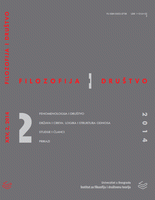Intentionality and Objectification
Intentionality and Objectification
Author(s): Ádám TakácsSubject(s): Philosophy
Published by: Institut za filozofiju i društvenu teoriju
Keywords: Husserl; Simmel; Intentionalit;, Objectifiation; History; Cultural Objects
Summary/Abstract: Husserl’s transcendental turn can be best regarded as a turn in his phenomenological models of intentionality. While in the Logical Investigations, he maintains a conception according to which intentionality is a structure of cognitive directedness in which objectification plays a formative role, in his later works the intentional relation is considered as a structure of consciousness founded on a sphere of purely subjective interiority. This paperargues that if Husserl had extended the scope of his early phenomenological research to the problems of object formation in the domain of historical and cultural sciences (Geisteswissenschaften), the radical subjectively oriented transformation of his theory of intentionality would have been much more difficult, if not impossible. We also argue that in Simmel’s theory of historical cognition and culture one can detect the elements of a theory of intentionality that can account for what is missing in Husserl, namely the attention devoted to the specific constitution of social and cultural objects. It is precisely the objective mediation through exteriorization and symbolization deployed in social and cultural values, and in historical time that constitutes the specificity of these objects which also conditions subjective experiencing, rather than remains dependent on it.
Journal: Filozofija i društvo
- Issue Year: 25/2014
- Issue No: 2
- Page Range: 42-55
- Page Count: 14
- Language: English

